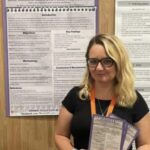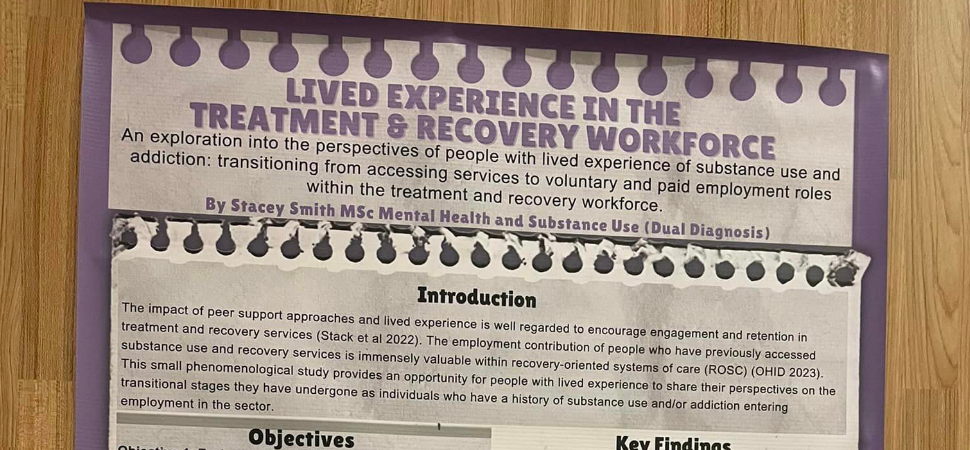An exploration into the perspectives of people with lived experience of substance use and addiction: transitioning from accessing services to voluntary and paid employment roles within the treatment and recovery workforce.
An overview of my research project which was conducted in 2024 as part of my Masters degree in Mental Health and Substance Use with Middlesex University and funded by a bursary awarded by the Society for the Study of Addiction.
Introduction
The impact of peer support approaches and lived experience is well regarded to encourage engagement and retention in treatment and recovery services (Stack et al 2022). The employment contribution of people who have previously accessed substance use and recovery services is immensely valuable within recovery-oriented systems of care (ROSC) (OHID 2023). This small phenomenological study provides an opportunity for people with lived experience to share their perspectives on the transitional stages they have undergone as individuals who have a history of substance use and/or addiction entering employment in the sector.
Objectives
Objective 1: Explore the motivations and benefits of people who have transitioned from accessing treatment and recovery services to working within them in voluntary or paid roles.
Objective 2: Examine any challenges, stigma and resulting barriers faced by people when seeking volunteering or employment opportunities in the sector.
Objective 3: Consider improvement strategies for providing support and opportunities for people with lived experience.
Objective 4: Develop recommendations to disseminate to local and national stakeholders to impact the recruitment, integration and support of people with lived and lived experience in the treatment and recovery sector.
Methodology
Ethical approval and consents.
Literature review of existing research and current UK guidance and policy. (From Harm to Hope, Black Independent Reports, Workforce Strategic Plan 24-34).
Qualitative Methods via semi-structured interviews
Convenience sampling within a an integrated treatment & recovery service and Lived Experience Recovery Organisation (LERO)
Interpretative Phenomenological Analysis (IPA) and Thematic Analysis (IPA)
Key Findings
- Reciprocity in Peer Work
- Self-Belief Through Employment Opportunities
- Employment and Career Change as Recovery Capital:
- Employment Reinforces Recovery:
- Strong internal motivation to Help Others
- Key Moments and Key People:
- Ongoing Workplace Stigma:
- Stigma Against Women
Other Considerations
What training and support provision is available and how can it be improved?
How can the sector offer the benefit of peer support roles for both living and lived experience to be inclusive and for people at all stages to be supported by their peers?
Conclusions & Recommendations
Recognise the value of living AND lived experience by offering peer support roles and implementing Continued Professional Development opportunities with consistent supervision and training. This benefits the whole workforce with shared learning opportunities for staff with living, lived and learned/professional experience, and the combination of these.
Continued Professional Development should include self-development opportunities to reinforce progress, self-belief and value.
Acknowledge the importance of professional boundaries in mandatory training with accessible policies and procedures to adhere to for all staff with lived. living and learned professional experience.
Harness the motivation people with living and lived experience have as experts in their field for reciprocal therapeutic relationships with people accessing services to impact engagement and improve treatment outcomes.
Strive to combat stigma in society as well as within the sector and demonstrate this commitment in practice, policy and terminology of messaging. Consider the stigma women who use or have used substances face, especially as mothers, and the accessibility of services and opportunities for them.
© 2024 Stacey Smith. All rights reserved.
This blog post and its contents are the intellectual property of Stacey Smith. Unauthorised use or duplication without express written permission from the author is prohibited. Excerpts and links may be used, provided that full and clear credit is given to Stacey Smith with appropriate and specific direction to the original content.


